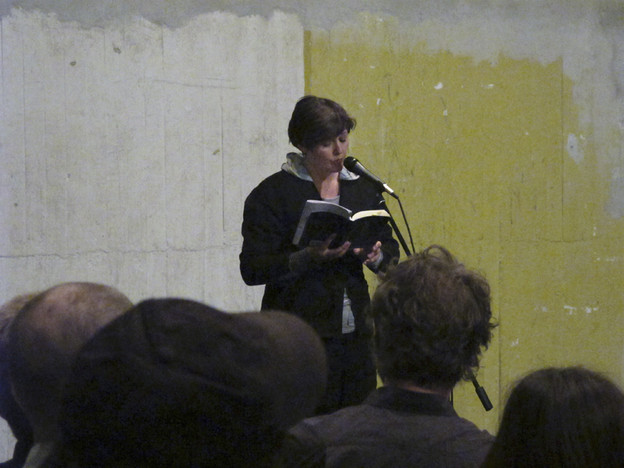
Caroline Bergvall's "Meddle English"
with excerpt: new@Sybil

photo: ©Cecilia Gronberg: Weld Gallery OEI reading, May 10, 2011
Caroline Bergvall has emerged over the past decade as one of the most brilliantly inventive poets of our time. Bergvall's new book, Meddle English, is multilectical, conceptual, sprung lyric – let's just say pataque(e)rical – extravaganza.
At Sibyl, the English portal of Sibila, we've published Bergvall's own excerpt from the first piece in her new book, which I asked her to send my way as I was eager to have at least part of this work readily accesible on-line. Here are two crucial passages which are for me a kind of manifesto for writing in our time, for the kind of poetries I want: a poetry that doesn't accept English as a standard but as a site for meddling: a meddling that allows for the kind of transformation that is the foundation of exchange. Indeed, Bergvall's comments on voice strike me as getting to the heart of a central concern in the expanded field of L=A=N=G=U=A=G=E: the aversion of "voice" in the pursuit of voices, voicings.
I repeat what many have said, that poetic or art language must not
implicitly be held to account of identities and national language,
the seductions of literary history, or the frequently fetishistic
methodologies of art movements, but rather seek, far and close, the
indicators and practices of language in flux, of thought in making:
pleasured language, pressured language, language in heated use,
harangued language, forms of language revolutionized by action,
polemical language structures that propose an intense deliberate
reappraisal of the given world and its given forms.
More often than not, we each use a voice that speaks for us before we
get to speak. Quite apart from the ideological implications and
beyond palliative arts methodologies, this is why so many of us
spend so much of our lives and imagination working at the undoing
of a voice or identity we do not wish to be tagged as and questioning
the methods of environments we might not wish to represent. It is
through this confusing, seemingly self-defeating process of dissociation,
of "disloyalty", that other forms of allegiances are made manifest
and other conductor channels can be generated.
In addition to its opening work of poetics, Meddle English includes a substantial selection of the Bergvall's remarkable Chaucerian vocal insinuations and extensions, as well as many other works that skirt the boundaries among sound/performance/visual/textual. Bergvall's Meddle English dwells in the space between languages, which for her is not an abstraction, not an idea, but an embodying/enveloping ground. Moving from but burrowing into ESL/PSL (English/poetry as a second language), Bergvall's bravura performances move toward a fluid third term, not bilingual but n-lingual, as in the the final section of "Cropper," woven with permutations of an English phrase in Norwegian and French, which brings us back around to her layered excavations of middle English, where the old literally melts into the new. Bergvall's is a poetics of the "nomadic" (in Pierre Joris's sense) and "disfluency" (as Jordan Scott uses the term), where blockages, stuttering, error, code switching, and skips are not fragments of lost whole but stiches that make up a fabric. In Meddle English the frogs in our throats become catnip.
Read the full selection from "Middling English" here.
I recently read with Bergvall in Copenhagen. Her marvelous reading that night is now on PennSound. It's a good place to being an acquaintance with Bergvall or to renew one:
Copenhagen, Gyldendal, May 8, 2011
(19:04): MP3
Note: parts and versions of Meddle English are on line:
Bergvall's "Cat in Throat," which appears in a shorter version in the book, was published in Jacket 37.
From "Shorter Chaucer Tales": "The Summer Talke" in Jacket 31, "The Franker Tale in Jacket 32 . "The Not Tale" in Poetry (listen also the PennSound recordings).
& do see Michael Leong's review just out of Meddle English in the Brooklyn Rail.
Bergvall at PennSound
& be sure to listen to her Close Listening program.